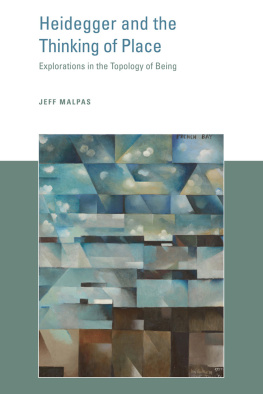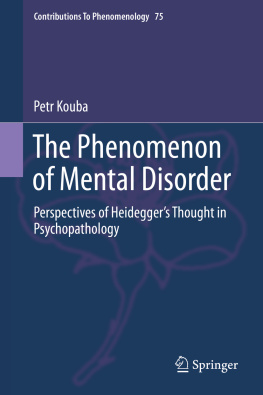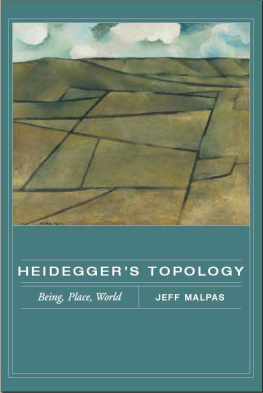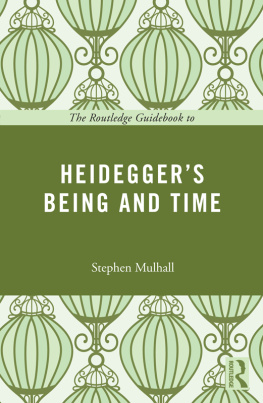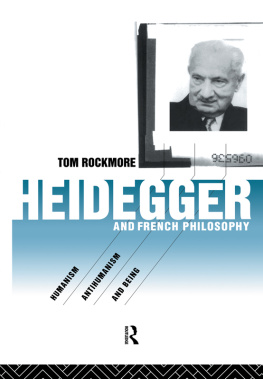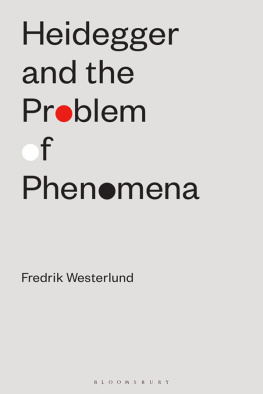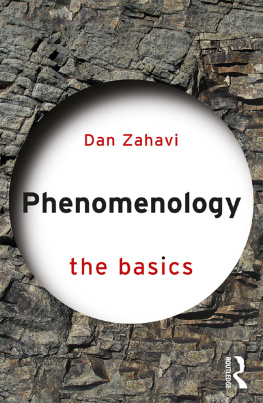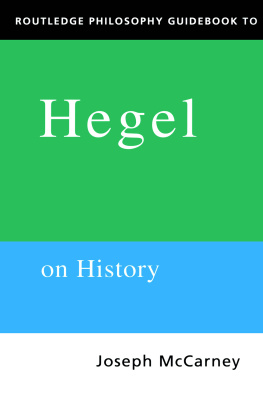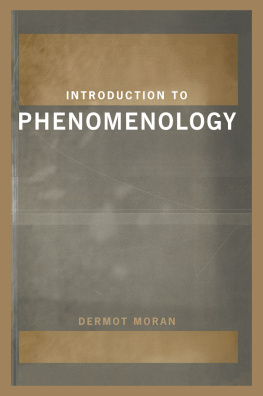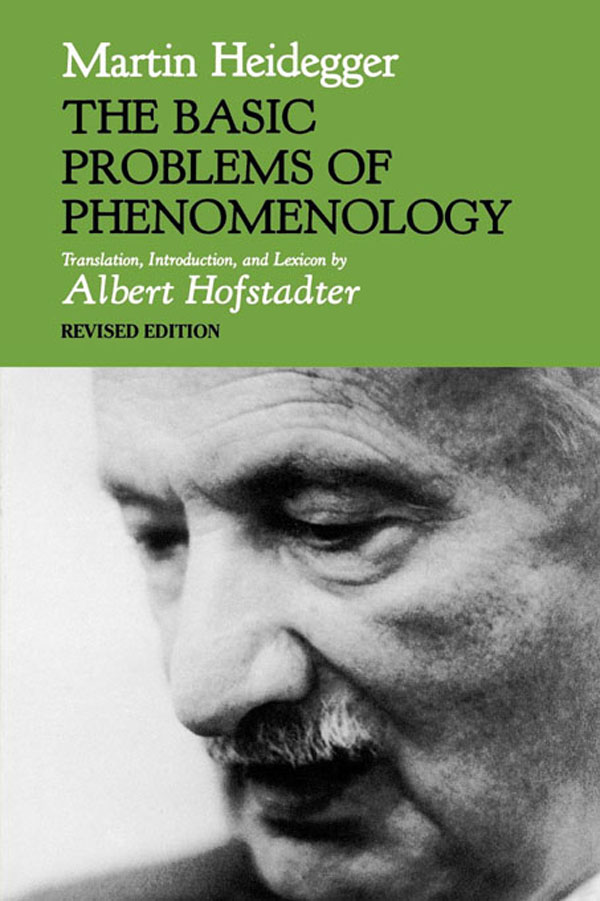THE BASIC PROBLEMS OF PHENOMENOLOGY
Studies in Phenomenology and
Existential Philosophy
GENERAL EDITOR
JAMES M. EDIE
CONSULTING EDITORS
David Carr
Edward S. Casey
Stanley Cavell
Roderick M. Chisholm
Hubert L. Dreyfus
William Earle
J. N. Findlay
Dagfinn Fllesdal
Marjorie Grene
Dieter Henrich
Don Ihde
Emmanuel Levinas
Alphonso Lingis
William L. McBride
J. N. Mohanty
Maurice Natanson
Frederick Olafson
Paul Ricoeur
John Sallis
George Schrader
Calvin O. Schrag
Robert Sokolowski
Herbert Spiegelberg
Charles Taylor
Samuel J. Todes
Bruce W. Wilshire
CONSULTANTS FOR HEIDEGGER TRANSLATIONS
Albert Hofstadter
Theodore Kisiel
John Sallis
Thomas Sheehan
Martin Heidegger
THE BASIC PROBLEMS OF PHENOMENOLOGY
Translation, Introduction, and Lexicon by
Albert Hofstadter
Revised Edition
Indiana University Press
BLOOMINGTON & INDIANAPOLIS
Preparation and publication of this book were aided by grants from the Programs for Translations and Publications of the National Endowment for the Humanities, an independent federal agency.
This book is a publication of
Indiana University Press
601 North Morton Street
Bloomington, IN 47404-3797 USA
http://iupress.indiana.edu
Telephone orders 800-842-6796
Fax orders 812-855-7931
Orders by e-mail
Published in German as Die Grundprobleme der Phnomenologie
1975 by Vittorio Klostermann
First Midland Book edition, 1988
1982 by Indiana University Press
All rights reserved
No part of this book may be reproduced or utilized in any form or by any means, electronic or mechanical, including photocopying and recording, or by any information storage and retrieval system, without permission in writing from the publisher. The Association of American University Presses Resolution on Permissions constitutes the only exception to this prohibition.
The paper used in this publication meets the minimum requirements of American National Standard for Information SciencesPermanence of Paper for Printed Library Materials, ANSI Z39.48-1984.
Manufactured in the United States of America
Library of Congress Cataloging-in-Publication Data
Heidegger, Martin, 18891976.
The basic problems of phenomenology.
(Studies in phenomenology and existential philosophy) Translation of: Die Grundprobleme der Phnomenologie. 1. PhenomenologyAddresses, essays, lectures.
I. Title. II. Series
B3279.H48G7813 142.7 80-8379
ISBN 978-0-253-17687-5 AACR2
ISBN 978-0-253-20478-3 (pbk.)
10 11 12 13 13 12 11 10
Contents
TRANSLATORS PREFACE
The Basic Problems of Phenomenology, a translation of Die Grundprobleme der Phnomenologie, is the text of a lecture course that Martin Heidegger gave at the University of Marburg in the summer of 1927. Only after almost half a century did Heidegger permit the text of the course to be published. Die Grundprobleme der Phnomenologie, edited by Friedrich-Wilhelm von Herrmann, appeared, for the first time, in 1975 as volume 24 of the multivolumed Martin Heidegger Gesamtausgabe presently in preparation (Frankfurt: Vittorio Klostermann).
In the Editors Epilogue, which follows the text, Professor von Herrmann explains that the book was composed, under Heideggers direction, by putting together Heideggers manuscript of the lectures and his typewritten copy, including his marginalia and insertions, with a contemporaneous transcription of the lectures by Simon Moser, a student in the course. The editor made decisions regarding a number of matters such as the division into parts and their headings; the treatment of insertions, transformations, changes, expansions, and omissions; and the inclusion of recapitulations at the beginning of lecture sessions. The resulting work is therefore only one possible version of the 1927 lecture course. But it is surely a very ample one, containing almost the whole of what was spoken and also much of what was not spoken at the time.
This volume represents the way in which Heidegger himself visualized the printed shape of these early lectures. Whatever imperfections the present text may contain, The Basic Problems of Phenomenology is a work of major importance, indispensable for obtaining a clear outlook upon the ontological-phenomenological region toward which Heidegger was heading when he prepared Being and Time, of which this is the designed and designated sequel. In it, one form of the Heideggerian Kehre took placea turning-around, from concentration upon the human being as Dasein, which in older thought was concentration upon the subject, to the passionately sought new focusing uponnot any mere object correlative to a subject butbeing itself.
In the Translators Introduction I have tried to provide a preparatory description of some of the thinking that leads up to and into this turn. Heideggers conception of the need for his own thought, like all philosophical thought (in the West at least), to orient itself first to the subject, the human Dasein, is even better understood in Basic Problems than it was in Being and Time, as due to the ontical-ontological priority of the Dasein, its being that being which, among all beings, has understanding-of-being, so that only by ontological analysis of the Dasein can we elucidate the conditions of possibility of a truly conceptualized understanding-of-being, that is to say, ontology, as science of being.
In Basic Problems the journey from this preliminary Daseinsanalytik toward the central region of the science of being accomplishes its first stages: (1) presentation of the basic problems of ontology (philosophy, phenomenology) by way of an examination of several historical attempts to deal with them, and (2) initiation of ontology by pressing on toward the final horizon upon which being can be projected in the understanding-of-being, namely, the horizon of temporality in a specific role designated as Temporality. The voyage has been made from being-and-time to time-and-being, from the first questioning about being which leads to the search for time, to the search through time to the horizon within it for being.
From this point onward it becomes possible to turn to ontology itself in its own name, fundamental ontology in the sense of having been founded, and to head toward the elucidation of the fundamental problematic subjects exhibited in Basic Problems: the ontological difference, the articulation of being, the multiplicity and unity of being, and the truth-character of beingall of them coming into integral unity in response to the one supreme question, that of the meaning of being in general. Readers of Heidegger will recognize developments of all these directional strains in the published writings from the thirties onward.
The present translation is intended to provide a maximally exact rendering of the text as published. I have resisted every temptation to transform or elucidate the text so as to make it more readable or (supposedly) more perspicuous in English than it is in German. It is my hope that a quotation can be made from this translation, from anywhere within it, with the confidence that one is quoting what the text saysnot what it might say in English, were that its original language, but what it actually says in a German that is faithfully translated into English. I hope and believe that no tailoring has been done, whether by deletion, addition, or transposition.




